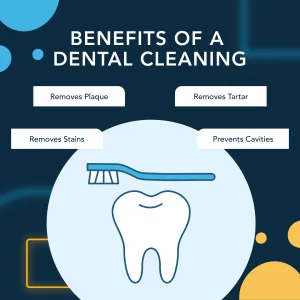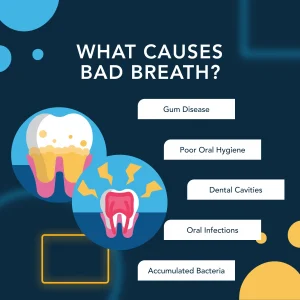Good oral health is a vital part of overall well-being, yet it’s often overlooked. Regular dental checkups are essential for maintaining healthy teeth and gums and preventing oral health issues before they become serious.
The American Dental Association (ADA) suggests that the frequency of these visits should be tailored to each individual’s needs as determined by their dentist. For many, this means a visit every six months, although some people may require more frequent appointments due to dental or health conditions.
What Happens During a Routine Dental Checkup?
A routine dental exam is a comprehensive assessment that plays a vital role in maintaining overall oral health. During these visits, dentists meticulously examine your teeth, gums, and mouth, looking for signs of decay, gum disease, and other potential issues.
The process typically includes a review of your medical history, professional teeth cleaning, X-rays, and screenings for oral cancer, followed by a discussion of any findings and the formulation of a treatment plan if necessary. Here’s what you can expect during a routine dental checkup:
Reviewing Your Medical History
The foundation of a successful dental treatment plan starts with understanding your overall health. This review can uncover conditions like diabetes or heart disease, which can significantly affect oral health. It also provides an opportunity to update your dentist on any new medications that could influence dental treatments or necessitate specific precautions.
 Cleaning Your Teeth
Cleaning Your Teeth
Cleaning your teeth during a dental visit goes beyond the routine brushing and flossing done at home. This professional cleaning, also known as prophylaxis, involves removing plaque and tartar buildup that can lead to cavities and gum disease. The process includes scaling to scrape off tartar and polishing to remove surface stains, leaving your teeth cleaner, brighter, and healthier. This preventive measure is crucial for maintaining optimal oral health.
Examining Your Teeth & Gums
This step is crucial for identifying early signs of decay, gum disease, and other oral health issues. A thorough examination can detect problems that, if left untreated, could lead to more severe conditions, underscoring the importance of regular checkups.
Taking Mouth X-Rays
Taking X-ray images of the mouth is an essential part of a dental examination, providing a detailed view of your oral health below the surface. These images reveal hidden problems such as cavities between teeth, jawbone damage, impacted teeth, and cysts. By identifying issues that aren’t visible to the naked eye, X-rays help your dentist create a more effective treatment plan, ensuring comprehensive dental care.
Screening for Oral Cancer
Screening for oral cancer is a necessary preventive measure during dental checkups. This quick, painless process involves examining the mouth for signs of cancerous and precancerous conditions. Early detection through screening significantly increases the chances of successful treatment, making it a vital step for maintaining oral health, especially for individuals at higher risk due to factors like tobacco use or heavy alcohol consumption.
Going Over Your Results & Treatment Options
After a thorough examination, your dentist will discuss the results with you and point out any areas of concern. This conversation includes exploring various treatment options for identified issues, whether it’s cavities, gum disease, or other conditions. Together, you’ll develop a personalized treatment plan tailored to your specific needs that ensures you’re fully informed and comfortable with the proposed steps to improve and maintain your oral health.
Scheduling Your Follow-Up Appointment
Before leaving your dental checkup, it’s crucial to schedule a follow-up appointment. This ensures ongoing care aligned with ADA oral health recommendations. By planning your next visit with a dentist in Plantation, Florida, you’re taking a proactive step towards continuous oral health and care.
What Happens During a Routine Teeth Cleaning?
A routine teeth cleaning is a fundamental aspect of dental care that’s designed to thoroughly cleanse your teeth and gums. During this prophylaxis process, dental professionals remove plaque and tartar, floss between teeth, and apply treatments like fluoride to protect against decay to ensure your mouth remains healthy and fresh.
Removing Plaque & Tartar
Plaque, a sticky film of bacteria, can harden into tartar, which is much tougher to remove. During regular visits, your dentist will remove any visible signs of plaque and tartar from the teeth and gumline. Dental hygienists use specialized instruments to gently scrape away these deposits, which helps prevent cavities, gum disease, and keep your teeth and gums healthy.
Flossing & Rinsing
Flossing and rinsing are key components of a comprehensive teeth cleaning visit. After removing plaque and tartar, the dental hygienist flosses between your teeth to remove any remaining food particles and plaque that might have been missed. After flossing, rinsing with an antibacterial mouthwash helps eliminate any loosened debris and bacteria, leaving your mouth feeling clean and refreshed, and further protected against gum disease and cavities.
Fluoride Treatment
Fluoride treatment involves applying a high concentration of fluoride directly onto the teeth to strengthen tooth enamel and make it more resistant to decay. It acts as a protective barrier for your teeth against the acids from plaque and sugars, effectively preventing enamel erosion and cavities while promoting a stronger, healthier dental structure for long-lasting oral health. This is especially important considering tooth enamel cannot regenerate once it’s eroded or damaged.
What Happens if You Don’t Go to the Dentist?
Neglecting regular visits to the dentist can lead to significant oral health issues, including the buildup of plaque and tartar, which contribute to tooth decay and gum disease. Without regular checkups, problems such as cavities, oral cancer, and other conditions may go undiagnosed and untreated, potentially escalating into more severe health complications. Poor oral health is also increasingly linked to systemic conditions, such as heart disease and diabetes.
Plaque Buildup & Tooth Decay
Plaque buildup is a sticky film of bacteria that forms on teeth, feeding on sugars from food and drink to produce acids that erode tooth enamel, leading to decay. Without regular removal through brushing and flossing, plaque can harden into tartar, further exacerbating tooth decay and leading to cavities, which can result in significant oral health issues if left untreated.
Gum Disease
Gum disease, beginning as gingivitis, involves inflammation and infection of the gums caused by plaque buildup. If untreated, it can progress to periodontitis, where the infection damages the bone supporting the teeth, leading to tooth loss. Symptoms include red, swollen gums, bleeding during brushing, and persistent bad breath. Regular dental checkups are crucial for early detection and treatment, preventing its advancement.
Bad Breath (Halitosis)
Bad breath, or halitosis, often stems from poor oral hygiene, leading to accumulated bacteria in the mouth that produce foul-smelling compounds. It can also indicate underlying dental problems like gum disease, cavities, or oral infections. Regular brushing, flossing, and dental checkups are essential for controlling halitosis and ensuring a healthy mouth and fresh breath. Persistent cases may require specific treatments to address the root cause.
Health Risks
Neglecting regular dental visits can escalate into significant health risks beyond oral health issues. Research links poor oral hygiene and gum disease to increased risk of heart disease, stroke, and diabetes due to the inflammation and bacteria entering the bloodstream. Furthermore, oral infections can complicate respiratory conditions and, in pregnant women, lead to preterm births. These systemic connections underscore the importance of maintaining oral health through regular dental care.
Tooth Loss
Tooth loss is a severe consequence of neglected oral health, which often results from advanced gum disease (periodontitis) or untreated tooth decay. It not only affects your ability to chew and speak but also leads to bone loss in the jaw, facial structure changes, and decreased self-esteem. Regular dental checkups and good oral hygiene practices are essential to prevent tooth loss and maintain overall oral health and well-being.
How Do I Keep My Teeth Healthy in Between Checkups?
Maintaining optimal oral health between dental checkups is crucial for preventing decay, gum disease, and other oral health issues. Effective dental practices such as brushing twice daily with fluoride toothpaste, flossing regularly, and using mouthwash can significantly reduce plaque buildup and bacteria in the mouth. Additionally, lifestyle choices like eating a balanced diet, limiting sugary snacks and acidic drinks, and avoiding tobacco products play a pivotal role in keeping your teeth and gums healthy and strong.
Brush Twice a Day
Brushing your teeth twice a day is important to remove plaque and bacteria in order to prevent tooth decay and gum disease. Using a soft-bristled brush and gentle circular motions, with proper technique, ensures thorough cleaning without damaging gums or enamel. Fluoride toothpaste strengthens tooth enamel and protects against cavities. Brushing in the morning is important to eliminate overnight bacteria buildup while brushing before bed removes daily accumulations.
Floss Every Time You Brush
Flossing every time you brush is crucial for removing plaque and food particles that your toothbrush can’t reach. This dental practice helps prevent cavities and gum disease by cleaning between teeth and along the gumline, areas prone to bacterial accumulation. Regular flossing also reduces bad breath by eliminating debris and bacteria lodged in tight spaces.
Use Anti-Cavity Mouthwash
Using an anti-cavity mouthwash is a simple and effective addition to your oral hygiene routine, offering extra protection against tooth decay. These mouthwashes contain fluoride, which strengthens tooth enamel and helps reduce demineralization caused by acidic foods and bacteria. Rinsing daily with an anti-cavity mouthwash can reach areas that brushing and flossing might miss, further reducing plaque, preventing cavities, and freshening breath.
Avoid Certain Foods
To protect your teeth and gums, it’s crucial to stay away from specific foods known to compromise oral health. These include:
- Sugary Snacks & Beverages
- Sticky Candies & Sweets
- Acidic Fruits & Drinks
- Hard Foods
These types of foods fuel harmful bacteria in the mouth, accelerate tooth decay, wear down tooth enamel over time, and pose a risk of cracking or chipping your teeth.
Avoid Smoking
Steering clear of smoking is essential for preserving oral health. The use of tobacco escalates the risk of developing gum disease, tooth decay, and oral cancer, while also causing chronic bad breath and discoloring teeth. Additionally, smoking compromises the immune system, which impairs the body’s ability to repair tissues within the mouth.
Drink Water With or After Meals
Drinking water with or after meals is beneficial for oral health. It helps wash away food particles and neutralizes acids produced by bacteria in the mouth. Water also stimulates saliva production, which is essential for maintaining a healthy pH balance, remineralizing teeth, and preventing dry mouth. Incorporating water into your mealtime routine is a simple yet effective step toward preserving your oral health in between checkups.
Schedule Your Next Dental Checkup Appointment
Scheduling your next dental checkup appointment is a proactive step toward safeguarding your oral health. Regular checkups allow your local Plantation dentist to monitor your oral health, catch potential issues early, and provide necessary dental treatments to prevent more serious problems.
These visits typically include a professional cleaning, examination, and possibly X-rays to ensure your teeth and gums remain in optimal condition. Schedule an appointment with a dentist near me today.
April 17, 2024

 Adult
Adult



 Cleaning Your Teeth
Cleaning Your Teeth